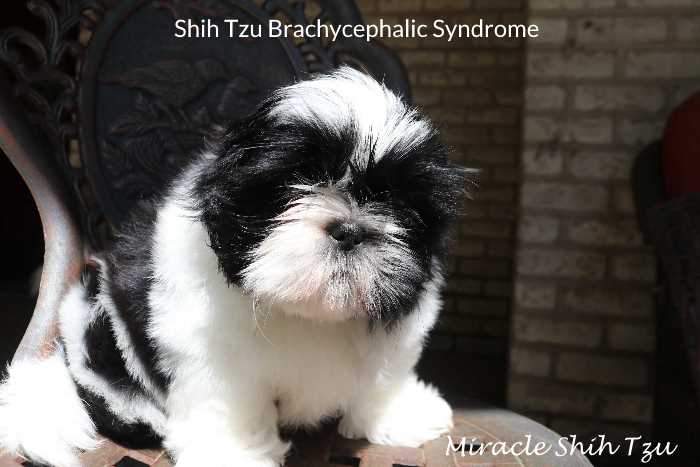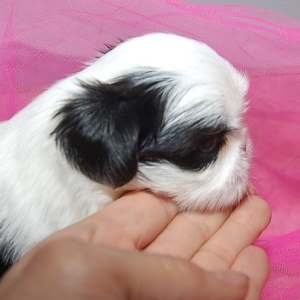Brachycephalic Syndrome in Shih Tzu Dogs: Why Worry?
By Janice Jones |Last Updated 07-07-2021
Brachycephalic Syndrome is not a disease per se, but a set of characteristics seen in many breeds with short noses.
So you have your heart
set on a puppy—the one with that tiny button nose. When you finally meet the puppy of your dreams, you notice he is snorting. What is
with that?
Like many breeds with short snouts such as English Bull Dogs, Pugs, Boston
Terriers, Pekingese, Cavalier King Charles Spaniels, Lhasa Apso, the Shih Tzu has a short
head making them prone to a disorder known as Brachycephalic airway obstruction
syndrome (BAOS).
 Brachycephalic Syndrome
Brachycephalic SyndromeSymptoms
Signs of Brachycephalic Syndrome in Shih Tzu Dogs
- Noisy breathing (Snorting)
- Coughing
- Gagging
- Decreased tolerance for exercise
- Overheating
- Snoring
- Restlessness
- In severe cases, collapse
Selective breeding for these cute little noses has resulted in these respiratory difficulties. Many of the breed standards specify that their snout be short.
People often find these little noses irresistible, so breeders will continually breed for
smaller and smaller noses.
 Flattened Faces with very Short Noses
Flattened Faces with very Short NosesBut not all Shih Tzu or other Brachycephalic dogs have severe problems.
The flatter the face, the more likelihood that the Shih Tzu will have some breathing issues.
Brachycephalic dogs are predisposed to upper respiratory tract problems, which are grouped under the term ’brachycephalic syndrome’ (BS).
This syndrome is a group of physical characteristics that vary in severity.
- Nostrils are narrowed (stenotic nares)
- Soft palate become elongated and thickened, meaning that the soft palate will extend farther back in the mouth and may partially block the airway.
- Narrowing of the trachea (windpipe) making air flow even more difficult
Problems vary in severity but most have some characteristics such as noisy breathing. Most have no further issues, but still others suffer from coughing, gagging, and a decreased tolerance for exercise.
One of the biggest problems that these dogs face is overheating, because when dogs overheat they pant to cool off and their panting can lead to swelling and narrowing of an already constricted airway.
Even gastrointestinal
problems can occur because these little dogs are working so hard at breathing, they may swallow
too much air.
Treatment Options

These problems are usually present at birth making it difficult to nurse. Most of these puppies do not survive. Others begin at weaning when the puppy is just learning to swallow food and breathe at the same time.
Sadly, there is little that can be done to help these puppies and most die shortly after trying to eat on their own.
All Brachycephalic dogs live with mild symptoms live the condition and adjust but some require treatment. Veterinarians often provide short term relief from airway inflammation with oxygen therapy and corticosteroids.
Sometimes surgery is indicated in dogs with severe anatomic faults that interfere with normal breathing. Surgery can help correct an excessively fleshy soft palate and widen the air passages in tiny nostrils.
If an elongated soft-palate is causing most of the distress, it can be shortened surgically. This will prevent it from protruding to far back in the throat.
If the puppy does have stenotic nares (narrow openings to the nasal passages) the veterinarian can remove a small wedge of tissue in the nares (nostrils) to open them up so that more air can flow in and out. Often veterinarians will want to do this when the puppy is anesthetized during a spay or neuter operation.
Home Treatment
For mildly affected dogs,
the best home remedies include:
- Provide mild
exercise
- Keep dogs indoors
in cool conditions; These dogs cannot live outdoors
- Maintain a
healthy weight; Obesity exacerbates the problem
- Provide sleeping
crates that allow air circulation on all sides
- If the dog travels by air, provide a larger than
normal travel crate that has ventilation on all four sides
- Provide regular veterinary care
"Hi, I'm Janice Jones, a former veterinary technician and Shih Tzu expert with over 40 years of experience with the breed. Through Miracle Shih Tzu, I combine my medical background and extensive breed knowledge to provide reliable, practical advice for Shih Tzu owners. My mission is to help you give your Shih Tzu the happiest, healthiest life possible through evidence-based information and real-world solutions. Whether you're new to the breed or a seasoned owner, you'll find trusted guidance here for all aspects of Shih Tzu care.
I hold an undergraduate degree in Psychology with a minor in biology, Early Childhood Education, and Nursing, and a Master's in Mental Health Counseling.



